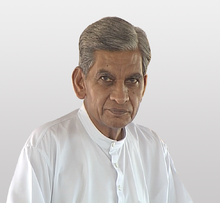Prem Saran Satsangi
| Prem Saran Satsangi (Radhasoami Satsang Dayalbagh) | |
|---|---|

Prem Saran Satsangi
|
|
| Born |
9 March 1937 Varanasi, Uttar Pradesh, India |
| Residence | India |
| Nationality | Indian |
| Alma mater | |
| Known for |
|
| Awards |
|
| Scientific career | |
| Fields | Consciousness, Quantum Theory, Systems Engineering |
| Institutions | |
| Thesis | A physical systems theory modelling frame work generalized for large scale economic system. (1968) |
| Doctoral advisor | Dr. Jack B. Ellis |
| Influences | |
Prem Saran Satsangi is the Spiritual Leader (the eighth Sant Satguru) of Radhasoami Faith, Dayalbagh.
Satsangi has applied western scientific techniques to study the consciousness of the sages of the east. He holds the Emeritus Chair from the East of the Integrated East-West Forum at The Science of Consciousness Conferences since 2012.
He is the chairman of Advisory Committee on Education, Dayalbagh Educational Institute, a think-tank constituted to suggest inter-alia steps necessary for achieving highest levels of excellence in education at all levels.
Satsangi was born on the campus of Banaras Hindu University, Varanasi on the day of Indian festival Holi on 9 March 1937, to Krishna Kumar, a Professor of Botany at Agriculture College, Banaras Hindu University and Bhakt Saheli.
He studied electrical engineering at the Banaras Engineering College and then studied for a B.Sc. in electrical engineering in the Banaras Engineering College (“BENCO”) and graduated in 1957 before taking a teaching job as temporary tutor.
In 1960 he accepted a scholarship at Michigan State University where the USAID extended his fellowship for Ph.D., but Satsangi declined the offer and returned to India in July 1961. Satsangi got an appointment as Reader in Electrical Engineering at MBM Engineering College and was appointed to the faculty in 1964.
Satsangi thereafter joined the Indian Institute of Technology Delhi, which was the youngest of IITs created as centers of excellence for higher education. In the initial years he taught basic network theory (analysis and synthesis), control theory and electric traction courses.
...
Wikipedia
